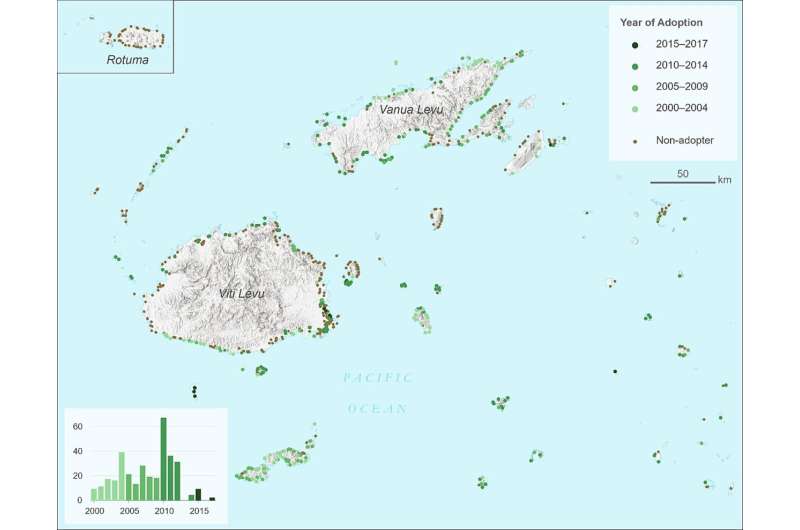This article has been reviewed according to Science X's editorial process and policies. Editors have highlighted the following attributes while ensuring the content's credibility:
fact-checked
trusted source
proofread
Communities more likely to adopt conservation measures if their neighbors have, says study

A new paper published in Global Environmental Change featuring Imperial College London researchers explores how Indigenous-led initiatives can be scaled to protect marine ecosystems.
Dr. Morena Mills and Dr. Tanya O'Garra from the Center for Environmental Policy worked alongside researchers from London, Fiji and the U.S. to investigate the factors influencing the scaling of the Indigenous-led Locally Managed Marine Areas (LMMAs) network in Fiji.
LMMAs are coastal areas and their marine resources that are managed by local coastal communities, with support from partner organizations such as non-governmental organizations (NGOs) and universities. The communities and these organizations together form the LMMA network, which supports the stewardship of marine resources to improve the livelihood and ecosystems of coastal communities.
The researchers found that communities were more likely to adopt LMMAs if their neighbors had. The findings noted that 45% of coastal villages in Fiji had adopted LMMAs and that more than 70% of those villages had neighbors that had previously adopted LMMAs.
Additional factors found to encourage the joining of the LMMA network included perceived benefits, a community's distance to tourist hubs, presence of support organizations such as an NGO and trust in external organizations. However, the researchers found that no singular factor alone caused the uptake of LMMAs. In Dr. Mills' words, "these conservation initiatives are providing multiple benefits and people are engaging with them because of multiple reasons."
Working with Fijian partners
This research was only possible through collaboration with Fijian researchers and local communities. Dr. Mills said that the rapid spread of LMMAs in Fiji was seen as a "really important example around the world of communities being empowered."
"While there have been lots of conservation initiatives that have been started... there are few examples of ones that have spread really widely," she said.
As well as being brilliant scientists, working with Fijian scientists brought critical insight to the historical and cultural context of this initiative. Over the last 15 years, Dr. Mills has been working with a group of Fijian researchers, allowing her to build "these really strong connections... important for any good science."
Although this partnership brought logistical challenges, such as navigating Fiji and forming connections with the 146 villages involved in the study, the researchers see working directly with communities as crucial to ensuring the widespread application of their findings.
Dr. Mills' experience co-leading a research group focused on the adoption and spread of conservation initiatives led her to play a key role in conceptualizing and developing this project.
Looking to the future
Based on their findings, the research team has developed a handbook to support practitioners thinking about scaling their own conservation initiatives.
Dr. Mills is also collaborating with the Department of Mathematics and Faculty of Engineering to develop an app that allows practitioners to predict the spread of their own conservation initiatives.
She also hopes their research can help practitioners learn "more about how to scale but especially how to scale appropriately," to ensure that communities benefit from the biodiversity around them for generations to come.
More information: Arundhati Jagadish et al, Scaling Indigenous-led natural resource management, Global Environmental Change (2024). DOI: 10.1016/j.gloenvcha.2024.102799
Provided by Imperial College London





















